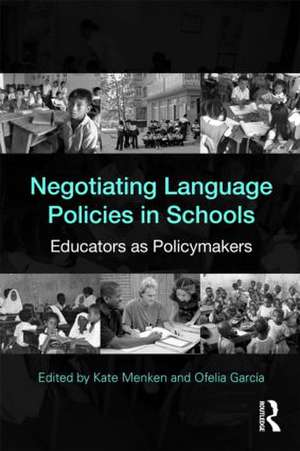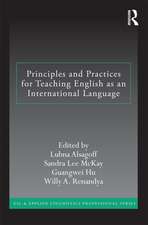Negotiating Language Policies in Schools: Educators as Policymakers
Editat de Kate Menken, Ofelia Garciaen Limba Engleză Paperback – 18 feb 2010
Each chapter shares findings from research conducted in specific school districts, schools, or classrooms around the world and then details how educators negotiate policy in these local contexts. Discussion questions are included in each chapter. A highlighted section provides practical suggestions and guiding principles for teachers who are negotiating language policies in their own schools.
| Toate formatele și edițiile | Preț | Express |
|---|---|---|
| Paperback (1) | 480.46 lei 43-57 zile | |
| Taylor & Francis – 18 feb 2010 | 480.46 lei 43-57 zile | |
| Hardback (1) | 1227.03 lei 43-57 zile | |
| Taylor & Francis – 18 feb 2010 | 1227.03 lei 43-57 zile |
Preț: 480.46 lei
Nou
Puncte Express: 721
Preț estimativ în valută:
91.94€ • 95.41$ • 76.85£
91.94€ • 95.41$ • 76.85£
Carte tipărită la comandă
Livrare economică 17-31 martie
Preluare comenzi: 021 569.72.76
Specificații
ISBN-13: 9780415802086
ISBN-10: 0415802083
Pagini: 296
Ilustrații: 2 tables and 3 line drawings
Dimensiuni: 152 x 229 x 15 mm
Greutate: 0.41 kg
Ediția:1
Editura: Taylor & Francis
Colecția Routledge
Locul publicării:Oxford, United Kingdom
ISBN-10: 0415802083
Pagini: 296
Ilustrații: 2 tables and 3 line drawings
Dimensiuni: 152 x 229 x 15 mm
Greutate: 0.41 kg
Ediția:1
Editura: Taylor & Francis
Colecția Routledge
Locul publicării:Oxford, United Kingdom
Cuprins
Foreword, Nancy H. Hornberger
1. Introduction, Kate Menken & Ofelia García
Part I: Negotiation of Language Education Policies Guided by Educators' Experiences or Identity (Individual)
2. Appropriating Language Policy on the Local Level: Working the Spaces for Bilingual Education, David Cassels Johnson and Rebecca Freeman
3. Two-Teacher Classrooms, Personalized Learning and the Inclusion Paradigm in the United Kingdom: What's in it for Learners of EAL? Angela Creese
4. "Tu Sais Bien Parler Maîtresse!": Negotiating Languages other than French in the Primary Classroom in France, Christine Hélot
5. "Angles Make Things Difficult": Teachers' Interpretations of Language Policy and Quechua Revitalization in Peru, Laura Alicia Valdiviezo
6. Towards Normalizing South African Classroom Life: The Ongoing Struggle to Implement Mother-Tongue Based Bilingual Education, Carole Bloch, Xolisa Guzula, and Ntombizanele Nkence
7. Enacting Language Policy through the Facilitator Model in a Monolingual Policy Context in the United States, Bonnie English and Manka M. Varghese
8. Between Intended and Enacted Curricula: Three Teachers and a Mandated Curricular Reform in Mainland China, Yuefeng Zhang and Guangwei Hu
Part II: Educators' Negotiation of Language Education Policies Influenced by Situation/Context/Community (Social)
9. Māori Language Policy and Practice in New Zealand Schools: Community Challenges and Community Solutions, Mere Berryman, Ted Glynn, Paul Woller, and Mate Reweti
10. (Re)Constructing Language Policy in a Shi'i School in Lebanon, Zeena Zakharia
11. Cases of Language Policy Resistance in Israel's Centralized Educational System, Elana Shohamy
12. Traversing the Linguistic Quicksand in Ethiopia, Michael Daniel Ambatchew
13. Language Policy in Education and Classroom Practices in India: Is the Teacher a Cog in the Policy Wheel? Ajit K. Mohanty, Minati Panda, and Rashim Pal
14. Chilean Literacy Education Policies and Classroom Implementation, Viviana Galdames and Rosa Gaete
Part III: Moving Forward
15. Stirring the Onion: Educators and the Dynamics of Language Education Policies (Looking Ahead), Ofelia García and Kate Menken
16. Moving Forward: Ten Guiding Principles for Teachers, Ofelia García and Kate Menken
1. Introduction, Kate Menken & Ofelia García
Part I: Negotiation of Language Education Policies Guided by Educators' Experiences or Identity (Individual)
2. Appropriating Language Policy on the Local Level: Working the Spaces for Bilingual Education, David Cassels Johnson and Rebecca Freeman
3. Two-Teacher Classrooms, Personalized Learning and the Inclusion Paradigm in the United Kingdom: What's in it for Learners of EAL? Angela Creese
4. "Tu Sais Bien Parler Maîtresse!": Negotiating Languages other than French in the Primary Classroom in France, Christine Hélot
5. "Angles Make Things Difficult": Teachers' Interpretations of Language Policy and Quechua Revitalization in Peru, Laura Alicia Valdiviezo
6. Towards Normalizing South African Classroom Life: The Ongoing Struggle to Implement Mother-Tongue Based Bilingual Education, Carole Bloch, Xolisa Guzula, and Ntombizanele Nkence
7. Enacting Language Policy through the Facilitator Model in a Monolingual Policy Context in the United States, Bonnie English and Manka M. Varghese
8. Between Intended and Enacted Curricula: Three Teachers and a Mandated Curricular Reform in Mainland China, Yuefeng Zhang and Guangwei Hu
Part II: Educators' Negotiation of Language Education Policies Influenced by Situation/Context/Community (Social)
9. Māori Language Policy and Practice in New Zealand Schools: Community Challenges and Community Solutions, Mere Berryman, Ted Glynn, Paul Woller, and Mate Reweti
10. (Re)Constructing Language Policy in a Shi'i School in Lebanon, Zeena Zakharia
11. Cases of Language Policy Resistance in Israel's Centralized Educational System, Elana Shohamy
12. Traversing the Linguistic Quicksand in Ethiopia, Michael Daniel Ambatchew
13. Language Policy in Education and Classroom Practices in India: Is the Teacher a Cog in the Policy Wheel? Ajit K. Mohanty, Minati Panda, and Rashim Pal
14. Chilean Literacy Education Policies and Classroom Implementation, Viviana Galdames and Rosa Gaete
Part III: Moving Forward
15. Stirring the Onion: Educators and the Dynamics of Language Education Policies (Looking Ahead), Ofelia García and Kate Menken
16. Moving Forward: Ten Guiding Principles for Teachers, Ofelia García and Kate Menken
Notă biografică
Kate Menken is Assistant Professor of Linguistics at Queens College of the City University of New York (CUNY), and a Research Fellow at the Research Institute for the Study of Language in an Urban Society at the CUNY Graduate Center.
Ofelia García is Professor in the Ph.D. programs in Urban Education and Hispanic and Luso-Brazilian Literatures and Languages at the Graduate Center of the City University of New York.
Ofelia García is Professor in the Ph.D. programs in Urban Education and Hispanic and Luso-Brazilian Literatures and Languages at the Graduate Center of the City University of New York.
Recenzii
"....This focus on the teacher-level in education language policies is welcome and long overdue....This is an excellent book that makes an important and outstanding contribution to the field. It is highly recommended for teachers and scholars working in the field of language education policies." --Education Review
"The editors have assembled a unique collection of state-of-the-art essays on language policies and education that focus on the role of teachers in the implementation of language policies in a wide range of educational contexts. All of the essays are informative, interesting and of a very high quality. Educational linguists, sociolinguists, applied linguists, teachers, future teachers and anyone else interested in the impact of language policies on classroom interactions would do well to read this volume."--Teachers College Record
"…An especially timely contribution in light of the growing impact of transmigration and globalization in education systems around the world."--Teresa McCarty, Arizona State University
"Kate Menken and Ofelia García have edited an important volume on multilingual language policy. Negotiating Language Policies in Schools: Educators as Policymakers comprises 13 studies, mostly qualitative, which shift the discussion of language policy from a macro to a micro-ideological discursive space. The voices and agencies of mostly – but not exclusively– teachers as policy-makers are richly textured with nuanced evidence throughout."—Language and Education
"The editors have assembled a unique collection of state-of-the-art essays on language policies and education that focus on the role of teachers in the implementation of language policies in a wide range of educational contexts. All of the essays are informative, interesting and of a very high quality. Educational linguists, sociolinguists, applied linguists, teachers, future teachers and anyone else interested in the impact of language policies on classroom interactions would do well to read this volume."--Teachers College Record
"…An especially timely contribution in light of the growing impact of transmigration and globalization in education systems around the world."--Teresa McCarty, Arizona State University
"Kate Menken and Ofelia García have edited an important volume on multilingual language policy. Negotiating Language Policies in Schools: Educators as Policymakers comprises 13 studies, mostly qualitative, which shift the discussion of language policy from a macro to a micro-ideological discursive space. The voices and agencies of mostly – but not exclusively– teachers as policy-makers are richly textured with nuanced evidence throughout."—Language and Education
Descriere
Bridging the divide between policy and practice, this book explores how educators interpret, negotiate, resist, and (re)create language policies in schools, focusing on their central role in this complex and dynamic process.







